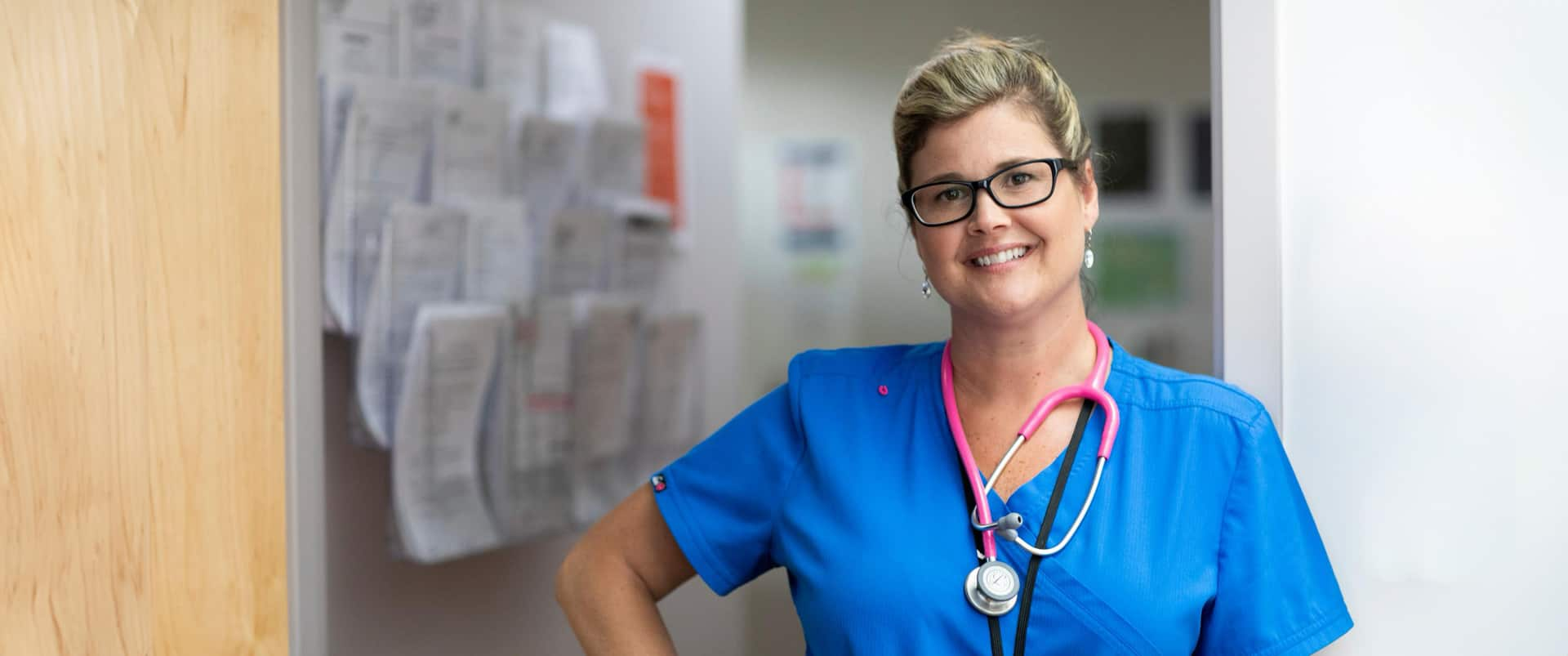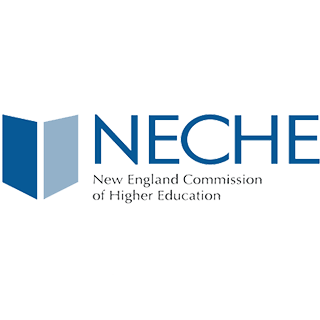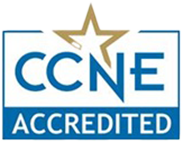SNHU Joins Sigma, Global Nursing Honor Society
Health | 2min Read

Become an advocate for change and develop skills to implement a culture of safety with an online Master of Science in Nursing (MSN) Healthcare Quality and Safety degree from Southern New Hampshire University (SNHU).
This MSN track can help you become a leader in healthcare quality and safety, capable of advocating for policy change to improve healthcare outcomes and promote a continual state of readiness.

Our MSN program is accredited by the Commission on Collegiate Nursing Education (CCNE) and based on professional nursing standards and guidelines. The MSN Healthcare Quality and Safety curriculum promotes advanced nursing knowledge across the 4 spheres of care and is grounded in evidence-based practice, interprofessional leadership and global health awareness.
In addition to the online coursework of the healthcare quality and safety track, you'll complete 135 clinical practicum hours under the guidance of a preceptor, providing an opportunity to apply theory to practice.
The online MSN in Healthcare Safety and Quality courses are designed to help you build the skills you need to advocate for a culture of safety and promote a continual state of readiness.
Visit the course catalog to view the full MSN in Patient Safety and Quality curriculum.
 At Southern New Hampshire University, we’re committed to your success — even beyond graduation. That’s why we’re dedicated to delivering accredited continuing education to nurses and healthcare professionals. From 1-hour webinars to multi-day conferences and more, these opportunities are built to help you continue to meet the community needs across the globe.
At Southern New Hampshire University, we’re committed to your success — even beyond graduation. That’s why we’re dedicated to delivering accredited continuing education to nurses and healthcare professionals. From 1-hour webinars to multi-day conferences and more, these opportunities are built to help you continue to meet the community needs across the globe.
Visit our SNHU continuing education page to learn more.
Southern New Hampshire University is accredited as a provider of nursing continuing professional development by the American Nurses Credentialing Center's (ANCC) Commission on Accreditation.
Students enrolled in the MSN program must comply with requirements of the organizations where their clinical practice experiences/practicum will be completed. These requirements may include (but are not limited to) a criminal background check, active and unencumbered license verification, immunization records and professional liability insurance. Students may incur additional costs to meet organizational requirements (ex. drug screening, physical examination, copay, etc.). These requirements must be met prior to registering for the clinical practice experience course.
It is a requirement that nursing students carry their own medical malpractice insurance while enrolled in practicum courses. At least 2 terms prior to the start of the clinical components, students will be required to demonstrate proof of having an active individual medical malpractice certificate.
Students enrolled in the MSN program courses are responsible for ensuring they have the minimum system hardware, software and equipment. In addition to the SNHU technology requirements, MSN students should have the following:
For nurse executive leadership and healthcare quality and safety tracks:
Minimum Specifications:
Additional Information:
SNHU has provided additional information for programs that educationally prepare students for professional licensure or certification. Learn more about what that means for your program on our licensure and certification disclosure page.
Looking to gain professional healthcare experience even before you graduate? Do it with HEaRT.
Specially designed for learners in healthcare and nursing, HEaRT (Higher Education and Real World Training) is a powerful experiential learning opportunity at SNHU. These online, asynchronous, voluntary experiences help connect you with employers to help solve real-world business problems, so you can be ready to make an impact in your field.
Our no-commitment application can help you decide if SNHU is the right college for you and your career goals. Apply up until 2 days before the term starts!
Upcoming term starts: July 6, 2026 | September 21, 2026
Attending college online at SNHU can be a life-changing experience. In fact, 93.4% of online students would recommend SNHU according to a 2025 survey with 8,718 respondents.
With Southern New Hampshire University's online MSN programs, you'll learn from instructors with industry experience. All of our 100% full-time faculty are doctorally prepared and come to the classroom with real-world healthcare experience.
Dr. Debra K. Sowell joined Southern New Hampshire University in 2016 as an adjunct faculty member with her decades of experience in healthcare and higher education. In 2018, she transitioned to her current position, serving as graduate faculty team lead, patient safety quality capstone coordinator and healthcare quality safety practicum coordinator. In 2023, Sowell received the Daisy Award for Extraordinary Nursing Faculty.
Position
Clinical Faculty, Graduate Nursing
Joined SNHU
2016
Education
"In the MSN in Patient Safety and Quality program, you'll participate in simulated and clinical experiences as you complete course work. In addition, you'll get supervised, clinical practicum hours in a healthcare setting that focuses on safety and quality."
Read more about Dr. Debra K. Sowell and other online faculty at SNHU.
You’ll take your courses within SNHU’s Brightspace platform. This is where you’ll find your:

At Southern New Hampshire University, you'll have access to a powerful network of more than 400,000 students, alumni and staff that can help support you long after graduation. Our instructors offer relevant, real-world expertise to help you understand and navigate the field. Plus, with our growing, nationwide alumni network, you'll have the potential to tap into a number of internship and career opportunities.
Recently, SNHU has been nationally recognized for leading the way toward more innovative, affordable and achievable education:
Founded in 1932, Southern New Hampshire University is a private, nonprofit institution with over 250,000 graduates across the country. SNHU is accredited by the regional accreditor New England Commission of Higher Education (NECHE), which advocates for institutional improvement and public assurance of quality.
No application fee. No test scores. And no college essay. Just a simple form with basic information. It’s another way SNHU helps you reach your goals sooner.
It's easy, fast and free.
Whether you're applying for an undergraduate or graduate degree, you’ll fill out a form to verify your previous education experience. As part of our admissions process, we'll help you request transcripts from your previous school(s) to see if you can transfer any credits into your SNHU program! (Also for free!)
Acceptance decisions are made on a rolling basis throughout the year for our 5 graduate terms. You can apply at any time and get a decision within days of submitting all required materials.
MSN admission requirements for the healthcare quality and safety track are:
Provisional acceptance may be extended to applicants with an undergraduate GPA between 2.67 and 2.99.
SNHU nursing programs are not authorized in the state of Washington or U.S. territories, and we are not accepting students residing in Washington state or U.S. territories into nursing programs at this time. Currently enrolled students who move into the state of Washington or a U.S. territory will not be able to continue in nursing courses until they move out of the state of Washington or the U.S. territory. Prospective students are encouraged to contact admission, and current students should contact their advisor, for more information.
Please note that we are currently only accepting students in the family nurse practitioner track in the following states: New Hampshire, Massachusetts, Connecticut, Rhode Island, Maine, Vermont, Texas, Florida, North Carolina, Virginia and New Jersey. Students must reside in 1 of these states while taking FNP courses at SNHU, and all practicum experiences must be completed in 1 of these states. Please note that the family nurse practitioner track is accepting applications from a limited number of students per term.
Applicants and students are advised that their success in their chosen program may be dependent on an ability to meet the Nursing Program Health and Technical Requirements (PDF).
After reviewing your official evaluation, you can decide if SNHU is right for you! If you choose to enroll, just pick your start date and get ready for classes to begin.
Talk to an admission counselor: 888.327.SNHU | enroll@snhu.edu
SNHU is accredited by the regional accreditor the New England Commission of Higher Education (NECHE). The university also carries specialized accreditations for some programs.
The baccalaureate degree program in nursing and the master’s degree program in nursing at Southern New Hampshire University are accredited by the Commission on Collegiate Nursing Education, 655 K Street NW, Suite 750, Washington, DC 20001, 202.887.6791.


As a nonprofit university, SNHU offers some of the lowest online tuition rates in the country. And when you work with our Financial Services team, we'll explore ways to help you save even more on your education – and customize a payment plan that works for you.
*before previously earned credits are applied
Tuition rates are subject to change and are reviewed annually.
**Note: Students receiving this rate are not eligible for additional discounts.
Additional costs: Course materials vary by course.
Students enrolled in the MSN program may be subject to ongoing licensure checks through a third party vendor, additional fees will apply and may vary by state.
If 3 of your prior learning credits ($659/credit) are accepted toward your master’s degree.
Your remaining tuition cost: $21,747
If 6 of your prior learning credits ($659/credit) are accepted toward your master’s degree.
Your remaining tuition cost: $19,770
If 9 of your prior learning credits ($659/credit) are accepted toward your master’s degree.
Your remaining tuition cost: $17,793
If 12 of your prior learning credits ($659/credit) are accepted toward your master’s degree.
Your remaining tuition cost: $15,816
How we estimate your tuition cost:
We look at the cost per credit multiplied by the number of credits you need to earn for a master's degree. Most master's degrees require 36 credits. SNHU allows you to transfer in up to 12 credits, requiring a minimum of 24 credits to be taken at SNHU. This is only a tuition estimator and doesn't account for other fees that may be associated with your program of choice.
Transfer credits toward your master's degree program at SNHU. If you’ve taken one course or many, we’ll evaluate them for you.
Fill out the FAFSA to see if you’re eligible for grants or work-study. (You could also be offered loans, though you’ll have to pay those back later.)
Earn credits in leadership, technology and more – while taking advantage of an online graduate tuition discount for active-duty service members and spouses.
Getting free money for college – from SNHU or an outside organization – could help you save hundreds or even thousands of dollars.
Bring in credits from popular options like CLEP, Sophia Learning, Google and other common credit for prior learning (CPL) experiences.
Learn how you can save money with tuition reimbursement from your employer.
Take advantage of an online tuition discount through your organization’s partnership with SNHU. Check with your employer to see if your organization partners with us and if you’re eligible for additional tuition savings and partner education benefits.
An MSN in Healthcare Safety and Quality can help prepare you to pursue roles as a nurse leader. Top treatment centers – including ANCC Magnet hospitals – are seeking nurses with advanced degrees to take their patient care to the next level.
When you earn your MSN in patient safety and quality, you'll gain the knowledge and skills you need to succeed in various healthcare settings, including:
Take the lead in a number of hospital settings, including emergency departments, trauma centers, intensive care and cardiology.
Improve the outcomes of patients through identifying inefficiencies and potential safety and quality measures and make recommendations to update policy, communication and culture.
Job growth projected nationally for medical and health services managers through 2032, according the U.S. Bureau of Labor Statistics (BLS).1
The median annual wage nationally for medical and health services managers as of May 2023, according to the BLS.1 Statistic not based on wage data for SNHU graduates.
Understanding the numbers
When reviewing job growth and salary information, it’s important to remember that actual numbers can vary due to many different factors—like years of experience in the role, industry of employment, geographic location, worker skill and economic conditions. Cited projections are based on Bureau of Labor Statistics data, not on SNHU graduate outcomes, and do not guarantee actual salary or job growth.

I had a good experience with my online studies. The program challenged me and provided ample opportunities to enhance my literature appraisal and writing skills.
George (Jorge) Carillo '20
MSN stands for Master of Science in Nursing. An MSN is a graduate-level degree designed to help prepare registered nurses for success in an advanced healthcare role. Healthcare quality and safety is a discipline within nursing that focuses on improving care outcomes through process, policy, practice and culture on both a macro and micro level.
At Southern New Hampshire University, you can earn your online MSN in Healthcare Safety and Quality, or pursue one of our other online MSN tracks: nursing executive leadership, population healthcare, nursing education or family nurse practitioner.
Nurses are one of many healthcare professionals that play a role in healthcare safety and quality.
Patient safety is not one single person's responsibility – it's a systematic issue that requires effective leadership, teamwork and communication.
As a nurse with an online MSN Healthcare Quality and Safety, you can gain the skills you need to lead teams as they implement better patient care processes. Armed with these skills, you can help make healthcare settings safer in a number of ways – such as preventing infection rates, establishing checks and balances to mitigate mistakes, and facilitating communication between staff, patients and their families.
Learn more about quality improvement in healthcare.
This depends on your chosen track. MSN tracks can help prepare you for roles in leadership, administration, population health, nursing education, nurse practitioner and more.
If you are interested in becoming an NP, Southern New Hampshire University does offer a family nurse practitioner track. This track aligns with nurse practitioner competencies and can help prepare you for nationally recognized nurse practitioner exams. After successfully passing an NP exam, you can then apply to your state board of nursing to become a practicing NP.
Learn more about how to become a nurse practitioner.
Healthcare quality and safety are very closely tied together. According to the National Academy of Medicine, patient safety is "indistinguishable from the delivery of quality health care."2
Together, healthcare quality and safety are designed to reach desired outcomes, prevent error, learn from errors when they do occur and build a culture that prioritizes the well-being of all patients, professionals and organizations.
The obvious answer is that better safety and quality measures lead to better care. Beyond that, the numbers indicating adverse harm in healthcare settings are staggering. In 2019, the World Health Organization (WHO) specifically noted that, in high-income countries, 1 in 10 patients is harmed while receiving hospital care.3 This harm is reportedly caused by a range of adverse events, and nearly 50% of these cases are considered preventable.3
Consider, too, that this data predated the COVID-19 pandemic. Recent world events have further exposed the vulnerabilities of systems within healthcare – from staffing to supply chain to a host of other complex needs.
In its 2021 report, "The Future of Nursing 2020-2030: Charting a Path to Achieve Health Equity," the National Academy of Medicine points out some of the issues that have come to light:
"In the current health care system, care is often disjointed, with processes varying between primary and specialty care and between traditional and emerging care sites," the report notes.4 "People may not understand the processes of the health care system, such as where they will receive care, how to make appointments, or the various providers with whom they may come into contact."4
Because of this, today's nurses need to be well-versed in the art of "care management" – a cornerstone of healthcare safety and quality that can help deliver superior outcomes for the patients that need it most.
1Bureau of Labor Statistics, U.S. Department of Labor, Occupational Outlook Handbook, on the internet, at:
Cited projections may not reflect local and/or short-term economic or job conditions and do not guarantee actual job growth.
2National Center for Biotechnology Information, Defining Patient Safety & Quality Care, on the internet, at https://www.ncbi.nlm.nih.gov/books/NBK2681/ (viewed Jul. 9, 2024)
3World Health Organization, 10 facts on patient safety, on the internet, at https://www.who.int/news-room/photo-story/photo-story-detail/10-facts-on-patient-safety (viewed Jul. 9, 2024)
4National Academies of Sciences, Engineering, and Medicine. 2021. The Future of Nursing 2020-2030: Charting a Path to Achieve Health Equity. Washington, DC: The National Academies Press. https://doi.org/10.17226/25982. (Jul. 9, 2024)